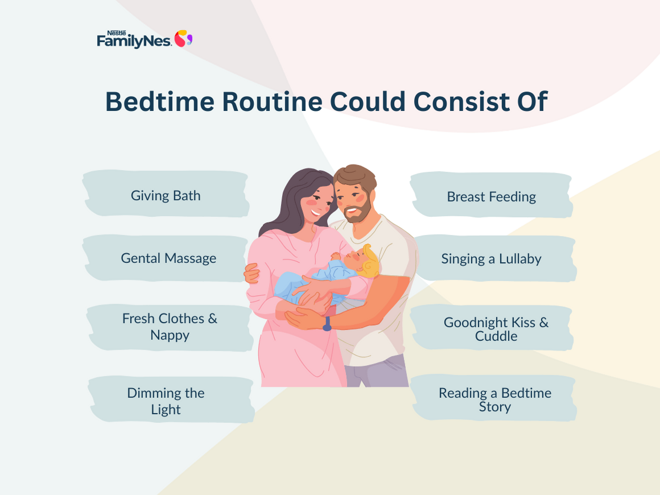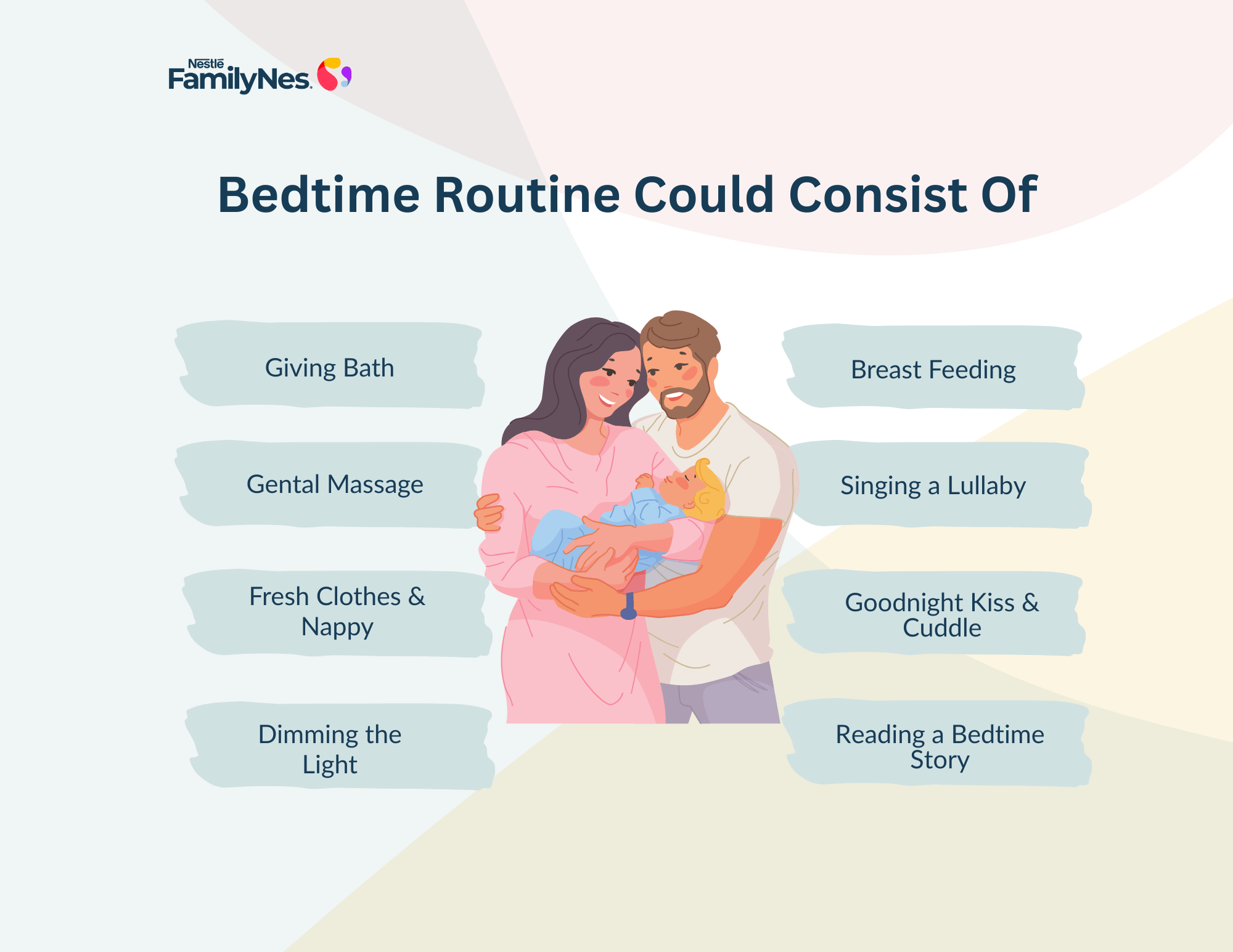
A bedtime routine is a gentle and comforting way to help your baby relax and get ready for sleep. It not only makes bedtime smoother but also creates a special time for you to bond with your little one.
Your baby's bedtime routine is a regular sequence of soothing activities that you undertake with them every night at the same time and in the same order1. By doing these activities repeatedly, your baby learns to recognize when it is time to go to sleep.
The most crucial things are to pay attention to your baby's signals. It is okay to keep things simple and avoid establishing a regimen that may be too demanding or burdensome for both of you.
How to establish sleep schedule for your baby?
Start at right time:
The earlier you start a bedtime routine, the more beneficial it will be. Usually, at around 6–8 weeks, babies develop circadian rhythms (the body undergoes through a 24-hour natural cycle of physical, mental, and behavioural changes) and start sleeping longer at night, making it the ideal time to implement a flexible eating and sleep schedule based on their personality and sleeping habits2.
Know about your baby's sleep patterns and wake window :
By tracking when your baby naturally gets sleepy and how long they stay awake between naps, you can schedule naps and bedtime at the right times. This helps prevent overtiredness, making it easier for your little one to fall asleep and stay asleep.
Be flexible:
Every baby is unique, and their sleep needs can change as they grow. Adjust your baby's sleep schedule to fit their natural rhythms, whether they prefer a structured routine or a flexible approach.
Recognizing Sleep Cues:
Pay attention to signs like eye-rubbing, yawning, or fussiness, as these indicate your baby is ready for sleep. Putting them down while drowsy but still awake helps them learn to self-soothe and develop healthy sleep habits.
Establishing a pre-sleep routine:
Creating a pre-sleep routine helps babies feel secure and relaxed before bedtime. Consistent routines also support their natural circadian rhythms, signalling when it is time to sleep.3

Creating a Consistent Daily Routine:
Keeping a regular schedule for wake times, naps, feedings, and play helps create a sense of security for your baby. A predictable routine also promotes better sleep by reinforcing healthy sleep patterns.
Encourage Self-Soothing:
Helping your baby learn to self-soothe is key to developing healthy sleep habits. If they fuss during sleep, give them a moment to settle on their own before intervening, as this encourages independent sleep skills over time.
In what ways does a bedtime routine improve a baby's sleep quality?
A bedtime routine helps teach good sleep habits, allowing babies to fall asleep faster and wake up less at night4. A soothing routine can also help regulate a baby’s body clock, and manage emotions. For parents, it is a special bonding time and contributes to better sleep for the whole family.
Once you establish a routine, give it time, as babies adjust gradually, and be patient through sleep regressions, teething, illness, and other disruptions.
Practice Points
- Follow the same bedtime steps consistently each night as often as possible.
- Incorporate 2–4 calming activities, such as feeding, bathing, massage, or reading.
- Encourage positive parent-child interactions before sleep.
- Keep the routine between 30–40 minutes
- Avoid disruptive activities like screen time, while considering individual child and family needs.
References
1. Mindell, J.A., Li, A.M., Sadeh, A., Kwon, R., Goh, D.Y., Bedtime routines for young children: a dose-dependent association with sleep outcomes, Sleep 38(5) (2015) 717-22.
2. Combs-Orme, T., Holden Nixon, B., Herrod, H.G., Anticipatory guidance and early child development: pediatrician advice, parent behaviors, and unmet needs as reported by parents from different backgrounds, Clin Pediatr (Phila) 50(8) (2011) 729-737.
3. Mindell JA, Williamson AA, Benefits of a Bedtime Routine in Young Children: Sleep, Development, and Beyond, Sleep Medicine Reviews (2017), doi: 10.1016/j.smrv.2017.10.007.
4. Elizabeth L. Adams, Jennifer S. Savage, Lindsay Master, Orfeu M. Buxton, Time for bed! Earlier sleep onset is associated with longer nighttime sleep duration during infancy. Sleep Medicine, Volume 73,2020,Pages 238-245,ISSN 1389-9457.


